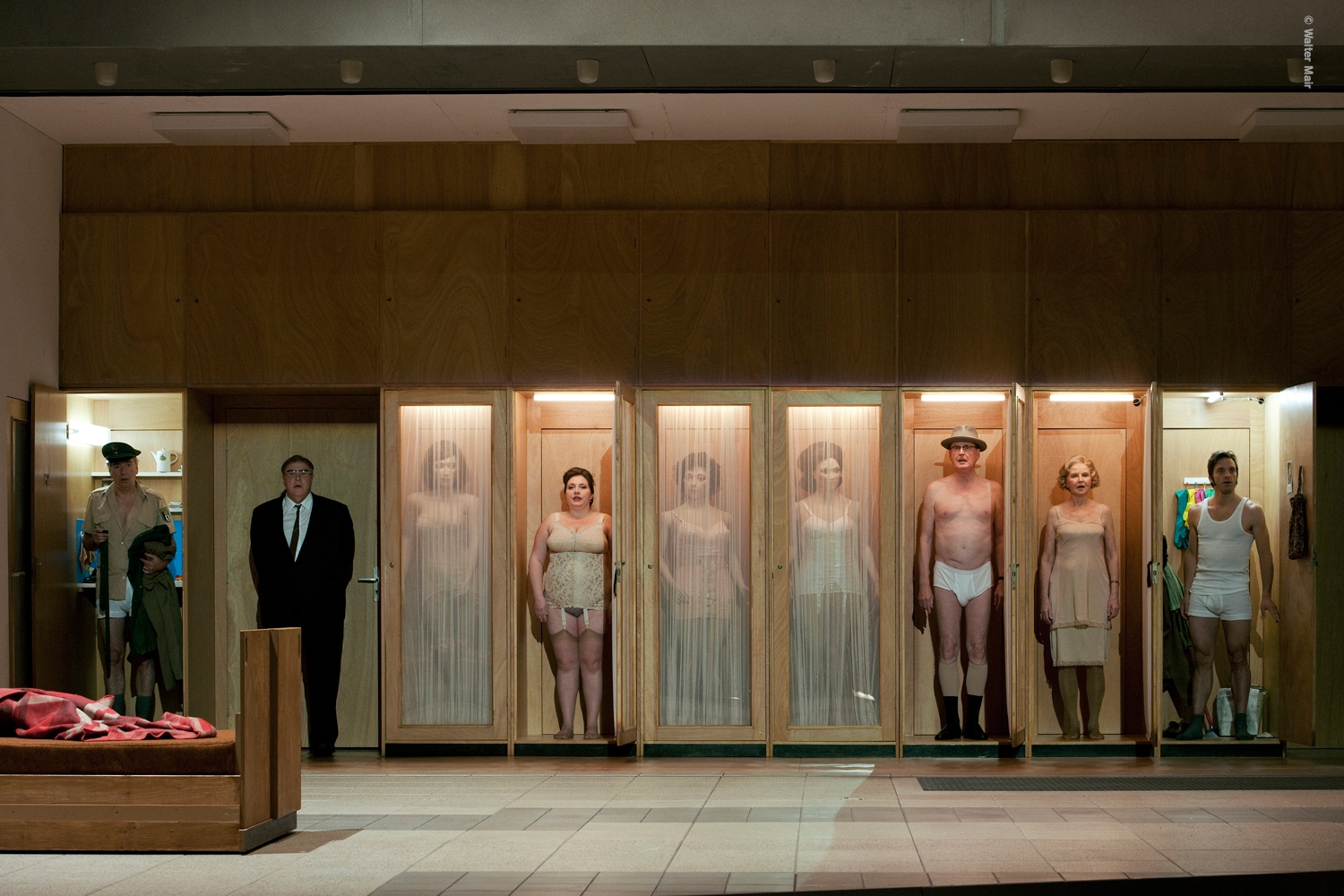


September 6th, 1929: premiere of ‘The Merchant of Berlin’. Erwin Piscator’s theatre near Nollendorfplatz in the centre of Berlin stages a political scandal. The SA, a paramilitary branch of the Nazi Party NSDAP, patrols in front of the theatre. In a furious pamphlet, Goebbels agitates against the playwright Walter Mehring: “Send him to the gallows!” The press savages Mehring, accusing him of both, pro-Jewish propaganda and anti-Semitic Jew-baiting at the same time.
Galician Jews, Prussian publicans, small-time crooks, generals, Freikorps thugs, industrial magnates, and lawyers frame the social panorama of ‘The Merchant of Berlin’.
Volksbühne Berlin sets out to rediscover the long forgotten author, one of the most ingenious satirists of the Weimar Republic on a par with Kurt Tucholsky.
Reading Mehring’s text is like reading the newspaper (not just one, but all of them!), watching a film (not merely one, - but all the films in the world!), is like getting overwhelmed by a city map, is like listening to all the voices of Berlin at that particular time, hearing them sing and shout, holler and scream. Mehring’s writing is reminiscent of a camera’s panning action shot of Berlin’s streetscapes during the interwar years. It mirrors the high and the low, contains fine and foul language, Yiddish, thieves’ slang, and all the empty phrases of the high society. Tucholsky wrote: “Mehring was the first man to literally fly over the city of Berlin!”
Kaftan, an east European Jew, is getting off the train at Alexanderplatz early in 1923, with nothing but 100 dollars in his pocket. French troops have occupied the Ruhr area and call for war reparations. The German government gets the money press started, and an unprecedented collapse of currency is setting in. Over the course of seven months, the reichsmark decreases in value against the dollar by several trillion times. The middle classes lose everything – money, possession, and property. People are suffering from famine, and barter trade has returned to everyday life. Müller, a lawyer and accomplished profiteer, is stinging Kaftan into speculating for inflation. Kaftan uses the 100 dollars to speculate with soap, exchanging the profit for bacon. Some time later, up the inflationary spiral, he already owns a whole bank. Then he becomes the proud owner of a waste disposal site near Jüterbog in the south of Berlin, which quickly turns out to be a secret weapons-cache. Within four weeks’ time, Kaftan has advanced to become one of the biggest financial magnates of Berlin. Taking advantage of Kaftan’s one weak point – his daughter Jesse’s illness -, Müller talks him into supporting a coup d’état by rightwing nationalist groups. Kaftan ultimately sees his capital squandered and dissipated by the political elite. Four hundred years after Shakespeare, Kaftan seems to be a Shylock of sorts, the tragicomic revenant of the Eternal Jew of the Elizabethan era.
As in Frank Castorf’s production “Berlin Alexanderplatz” adapted from Alfred Döblin, the city of Berlin plays a prominent role, with the Scheunenviertel at its centre. Different political camps come to radicalise at breathtaking pace in this crowded, filthy, grotty backwater between Grenadierstraße (now: Almstadtstraße) and the Volksbühne at Bülowplatz (now: Rosa-Luxemburg Platz): Communists and Jewish emigrants from the East, rightwing nationalist groups and the Schwarze Reichswehr – illegal armed forces of the Weimar Republic that soon became the rallying point for the Nazis.
The director Frank Castorf aptly orchestrates this extravagant, powerful drama around the original history of the Volksbühne and Piscator’s idea of modern political theatre. The spirit of Berlin as a heterogeneous, conflicting, lurid place, a melting pot on the brink of the universal catastrophe of humanity that would radically wipe out Jewish life, gets unleashed and restaged in this remarkable production.
With: Kathrin Angerer, Bärbel Bolle, Margarita Breitkreiz, Marc Hosemann, Dieter Mann, Sophie Rois, Mex Schlüpfer and Volker Spengler
Director: Frank Castorf
Stage Designer: Bert Neumann
Costumes: Tabea Braun
Light Design: Lothar Baumgarte
Dramaturgy: Sebastian Kaiser